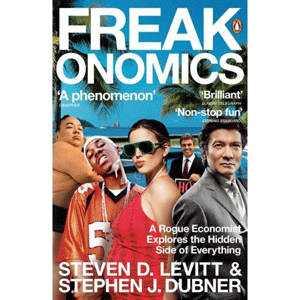Review: Freakonomics by Steven D. Levitt
This book was written by Stephen J. Dubner, a sort o ghostwriter for Steven D. Levitt , an economist, and was given to me by my father. It's full title is: Freakonomics: A Rogue Economist Explores the Hidden Side of Everything.
What Levitt does is that he describes/talks about a number of situations from the perspective of an economist. One of the most significant is when he links the right to have an abortion to the decline of crime. It seemed very logical. If you legalize abortion in the '70s, this will help a lot of teenage-girls who are pregnant but don't want to be. They will have an abortion. And to be honest, if you grow up in a one-parent family and your one parent is still very young than you don't have the best start in life. If these people aren't born ( I know this sounds incredibly harsh, but this is what the book says) that means there are less young people 18 years later that will probably go into crime. Yet, having done some research, I found out that this theory isn't solid! A man named Steve Sailer made a graph, showing that teen homicide tripled in the cohort born after the famous abortion-legalisation Roe vs. Wade. This could impossibly be if Levitt's theory was correct.
 The reason that I'm may be boring you with this part is because of what follows in Steve Sailer's article. He says that everyone doing research on the book on Google could have found out that this theory by Levitt was false. This, to me, is especially disturbing, because it means that all the reviewers that gushed about this book hadn't done any research. I guess what I'm trying to say is that maybe we have gotten lazy in reviewing. I'll just let Sailer say it himself:
The reason that I'm may be boring you with this part is because of what follows in Steve Sailer's article. He says that everyone doing research on the book on Google could have found out that this theory by Levitt was false. This, to me, is especially disturbing, because it means that all the reviewers that gushed about this book hadn't done any research. I guess what I'm trying to say is that maybe we have gotten lazy in reviewing. I'll just let Sailer say it himself:If you check out Sailer's article you can see many more graphs and evidence. I really liked this book before I knew it wasn't true. I know I sound a little complaining, but I read this book and was simply amazed by the "wisdom". When something like that turns out to be wrong and it also turns out that now one really seemed to care about checking whether it was true what they said, I am disappointed!
What I did like about this book was the way they tackled certain themes. It was fun to read, especially the part about the Klu Klux Klan. I had to laugh so bad when I read the following:
Ig a big society like the Klan has a secret handshake I can't really take them seriously, espeically when it involves a wiggle!
I give this book ...

3 Universes.
Of course this isn't a normal book, but I hate it when I like abook and then find out it isn't true or correct. Could you imagine reading a historic novel that you love and then at the end you find out that the entire plot is incorrect. You still enjoyed the book, but it leaves a bitter taste in your mouth.
Anyway, has anyone of you read the book?
What I did like about this book was the way they tackled certain themes. It was fun to read, especially the part about the Klu Klux Klan. I had to laugh so bad when I read the following:
The secret Klan handshake, for instance, was a left-handed, limp-wristed fish wiggle. When a traveling Klansman wanted to locate brethren in a strange town, he would ask for a “Mr. Ayak”—“Ayak” being code for “Are You a Klansman?” He would hope to hear, “Yes, and I also know a Mr. Akai”—code for “A Klansman Am I.”
Ig a big society like the Klan has a secret handshake I can't really take them seriously, espeically when it involves a wiggle!
I give this book ...

3 Universes.
Of course this isn't a normal book, but I hate it when I like abook and then find out it isn't true or correct. Could you imagine reading a historic novel that you love and then at the end you find out that the entire plot is incorrect. You still enjoyed the book, but it leaves a bitter taste in your mouth.
Anyway, has anyone of you read the book?
Being largely innumerate and unenterprising, the punditariat is unable or unwilling to apply simple reality checks to complex models. It's easier to simply engage in intellectual hero-worship and take a guru figure like Levitt on faith.



Comments
Post a Comment